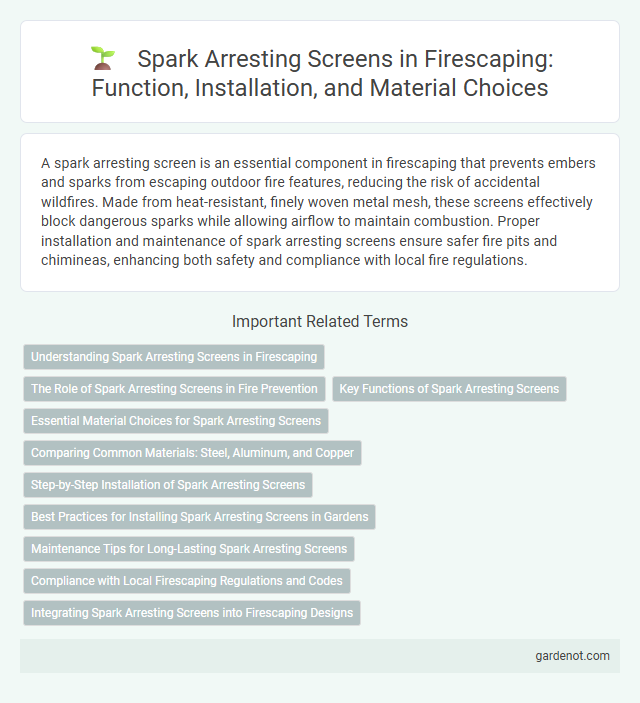A spark arresting screen is an essential component in firescaping that prevents embers and sparks from escaping outdoor fire features, reducing the risk of accidental wildfires. Made from heat-resistant, finely woven metal mesh, these screens effectively block dangerous sparks while allowing airflow to maintain combustion. Proper installation and maintenance of spark arresting screens ensure safer fire pits and chimineas, enhancing both safety and compliance with local fire regulations.
Understanding Spark Arresting Screens in Firescaping
Spark arresting screens play a crucial role in firescaping by preventing embers and sparks from escaping fire pits and outdoor fireplaces, significantly reducing the risk of accidental wildfires. These metal mesh screens are designed with fine perforations that block burning debris while allowing airflow for combustion, ensuring safety without compromising fire performance. Selecting a spark arresting screen with durable, weather-resistant materials enhances its effectiveness and lifespan in various outdoor environments.
The Role of Spark Arresting Screens in Fire Prevention
Spark arresting screens play a critical role in fire prevention by capturing and containing hot embers before they can ignite neighboring vegetation or structures. Made from durable, high-temperature-resistant materials such as stainless steel mesh, these screens effectively block sparks from chimneys, fireplaces, and outdoor fire pits. Their installation significantly reduces the risk of wildfires and property damage by preventing airborne embers from spreading flames.
Key Functions of Spark Arresting Screens
Spark arresting screens are essential safety components designed to prevent sparks and embers from escaping fireplaces, wood stoves, and chimineas, thereby reducing the risk of wildfires. These screens act as physical barriers that filter out burning particles while allowing airflow for efficient combustion. Their high-temperature resistance and durable mesh construction ensure long-lasting protection in various firescaping applications.
Essential Material Choices for Spark Arresting Screens
Spark arresting screens must be constructed from high-temperature resistant and corrosion-resistant materials such as stainless steel or galvanized steel to withstand intense heat and environmental exposure. Materials with tightly woven mesh sizes, typically between 1 to 4 millimeters, effectively contain sparks while allowing airflow to prevent fire hazards. Selecting durable alloys with excellent thermal conductivity and mechanical strength ensures long-lasting performance in firescaping applications.
Comparing Common Materials: Steel, Aluminum, and Copper
Spark arresting screens in firescaping must balance durability, weight, and corrosion resistance to effectively prevent embers from escaping. Steel offers superior strength and heat tolerance but is prone to rust without protective coatings. Aluminum provides lightweight corrosion resistance but may deform under intense heat, while copper combines moderate strength with excellent corrosion resistance and longevity, making material choice critical for specific environmental conditions.
Step-by-Step Installation of Spark Arresting Screens
Installing spark arresting screens involves first measuring the chimney or vent pipe diameter to ensure a proper fit, followed by selecting a durable, corrosion-resistant mesh material with a fine grid to effectively block sparks. Next, securely attach the screen to the chimney cap or pipe using stainless steel clamps or high-temperature resistant adhesives, ensuring it is tightly fastened to prevent gaps where embers could escape. Regular inspection and maintenance, including cleaning ash and debris buildup, are crucial to maintaining optimal spark arresting performance and reducing wildfire risks.
Best Practices for Installing Spark Arresting Screens in Gardens
Install spark arresting screens made of corrosion-resistant stainless steel mesh with a mesh size between 3/16 and 1/4 inch for optimal ember filtration. Ensure the screen covers all openings of fire pits, chimneys, and vents completely, securing edges tightly to prevent gaps that allow sparks to escape. Regularly inspect and clean the screen to maintain airflow and prevent clogging from debris or soot buildup, ensuring effective spark containment.
Maintenance Tips for Long-Lasting Spark Arresting Screens
Regularly clean spark arresting screens by removing accumulated soot and debris using a soft brush or compressed air to maintain optimal airflow and prevent clogging. Inspect screens for signs of rust, corrosion, or damage, replacing them promptly to ensure effective spark suppression and fire prevention. Apply a high-temperature resistant coating or lubricant to metal screens to extend durability and resist weather-related wear.
Compliance with Local Firescaping Regulations and Codes
Spark arresting screens are essential for meeting local firescaping regulations designed to prevent wildfire ignition from outdoor fire features. These screens comply with building codes by effectively trapping embers and sparks that could ignite surrounding vegetation. Proper installation and maintenance of spark arresting screens ensure adherence to community safety standards and reduce liability risks associated with fire hazards.
Integrating Spark Arresting Screens into Firescaping Designs
Integrating spark arresting screens into firescaping designs significantly reduces the risk of wildfire ignition by trapping embers and sparks from outdoor fire features. These screens, made from durable, corrosion-resistant materials, provide a critical barrier that prevents flying debris from escaping into dry landscaping areas. Strategic placement around fire pits, fireplaces, and chimineas enhances overall fire safety while maintaining aesthetic appeal and functionality in outdoor living spaces.
Spark Arresting Screen Infographic

 gardenot.com
gardenot.com